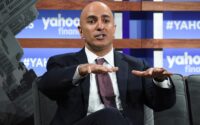Google grilled in closing arguments of DOJ antitrust case
A federal judge hammered key elements of Google’s defense on Thursday as closing arguments began in a landmark antitrust trial that could potentially upend the tech giant’s online search empire.
Judge Amit Mehta, who is expected to rule later this year on whether Google has maintained an illegal monopoly over the online search market, zeroed in on the company’s claims that it faces stiff competition despite holding an approximately 90% market share.
Google’s lawyers pointed to smaller search engines such as privacy-focused DuckDuckGo, tech giants like Microsoft and Amazon and even media outlets such as ESPN as opponents in the race for user eyeballs.
“You really think that DuckDuckGo is a competitor on Google?” the judge asked Google’s lawyers, according to AFP.
DuckDuckGo holds a less than 3% market share compared to Google’s 90% share, according to stats that surfaced during the trial.
Mehta also questioned whether rival search engines could be able to offer similar default deal packages to other companies, given the multi-billion-dollar price tag established by Google.
The exchange was just one example of sharp questions that Mehta aimed at both Google and the Justice Department’s legal team.
Mehta raised questions as to whether the DOJ’s legal team had sufficiently shown that Google’s default deals have had anti-competitive effects on rivals or stifled their ability to innovate.
Closing arguments will conclude on Friday.
DOJ antitrust chief Jonathan Kanter and Google president of global affairs Kent Walker were among the figures in attendance in court.
The Justice Department has argued that Google relied on billions in payments to partners — including $26.3 billion in 2021 alone — to ensure its search engine was enabled by default on most smartphones.
The judge warned that government attorneys faced a “hard road” to prove that Google had failed to innovate in online search over the last decade.
At one point during the hearing, Mehta pointed out that Microsoft admitted it did not put enough resources into building its mobile search business.
“That’s not anticompetitive, the fact that Google was smart enough to get on the mobile bandwagon before Microsoft,” Mehta said.
A Justice Department attorney fired back, asserting that a “mistake by one rival doesn’t mean Google gets to monopolize this market forever.”
Last fall’s trial included appearances by several high-profile witnesses, including Google CEO Sundar Pichai, Microsoft CEO Satya Nadella and key Apple executive Eddy Cue.
Unredacted documents from Cue’s testimony that surfaced Tuesday showed Google paid a whopping $20 billion to Apple in 2022 alone to be the default search engine on its Safari web browser.
If Mehta eventually rules against Google, a second trial will be held to determine an appropriate remedy to address the monopoly.
Experts have said that could include the implementation of a “choice screen” for users or even a breakup of Google’s business.
Google isn’t the only tech giant in the midst of federal antitrust proceedings.
The Justice Department filed an antitrust lawsuit against Apple earlier this year.
Separately, the Federal Trade Commission has pending actions against Meta and Amazon.
With Post wires


